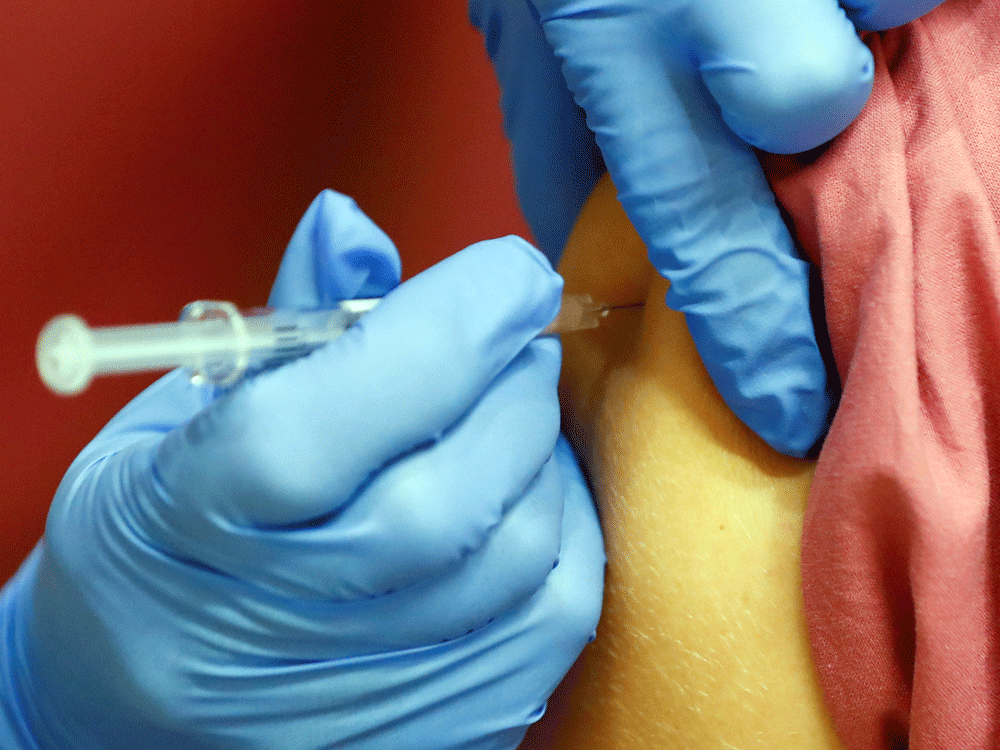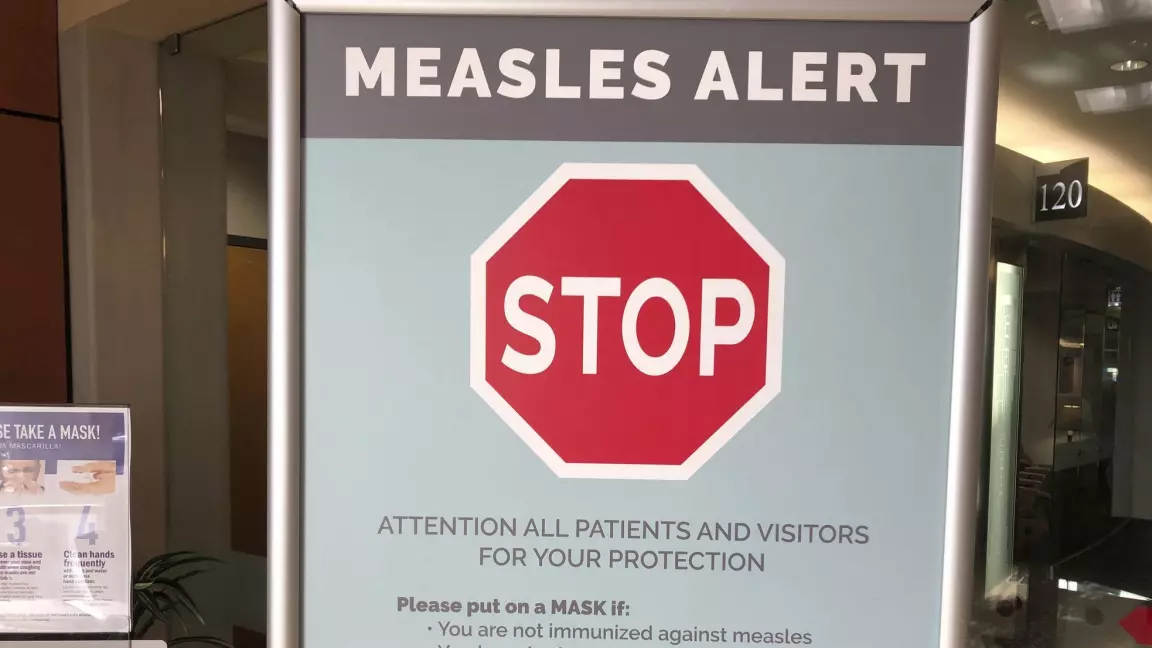The advisory committee recommended those over 70 be first in line for the vaccine, followed by health care professionals and then essential workers
Health
Federal government has plans on how to distribute the COVID-19 vaccine and who gets it first – Alberta Daily Herald Tribune

OTTAWA – Ending COVID-19’s assault on Canada will require an effective vaccine and the government has already decided who will get it first and is looking to set up a massive logistics operation to deliver it across the country.
Earlier this week, the arm’s length National Advisory Committee on Immunization recommended elderly people, specifically those over 70, be first in line for the vaccine, followed by health care professionals and then essential workers like police, firefighters and grocery store employees.
It also suggests making sure the vaccine is available early to people in close quarter facilities, like meat-packing facilities, prisons and homeless shelters where the virus has been able to spread quickly.
In a statement this week, Canada’s chief public health officer Dr. Theresa Tam said she was confident that Canadians will understand that some people have to be at the front of the line.
“Throughout this pandemic, we have seen people come together to protect those most at risk,” she said. “We know Canadians will understand the need to prioritize some groups during the early weeks of COVID-19 vaccine roll-out until there is enough vaccine for everyone who wants it.”
The advisory committee also recommended the government take into account how quickly and where the virus is spreading when the vaccines become available and whether some vaccine candidates may be more effective in certain populations.
Dr. Zain Chagla, an infectious disease specialist in Hamilton, Ont., said given their mortality rates to the virus, putting the elderly first makes sense.
“If you’re gonna put bang for the buck, for the people that are gonna deal with the brunt of the disease that need an intervention now, it’s going to be that,” he said.
Related
He said vaccinating everyone in long-term care homes for example won’t solve the problem, but it will be a major benefit to the people living there.
“Anything is better than nothing and if you roll it out correctly, even a small supply can have very profound implications for a locked-off population,” he said.
The advisory committee also recommends considering potentially targeting people with specific conditions, like obesity and heart disease, for early vaccination, but says there is still a need for more evidence before settling on a policy like that.
Chagla said they know that older, obese people often do poorly with the virus, but it is not universal.
“We still don’t know why one 50-year-old who’s obese goes to the ICU and the other 50 year old doesn’t,” he said.
He said one thing that could be worth considering as a vaccine rolls out is targeting people that have been identified as potential superspreaders. He said early research has shown most infected people spread the virus in a limited fashion, while others spread it aggressively, so called superspreaders.
Our anticipated delivery schedules are in line with the EU, Japan, Australia, and other jurisdictions
He said prioritizing those people might do a lot to bring down overall cases.
“if you prioritize that group, even though it seems counterintuitive, because they’re the healthiest? Would you get a significant amount more of community control.”
Through one-off deals and the government involvement in the COVAX facility, an international partnership, Canada potentially has access to a dozen vaccine candidates, but no vaccine has so far cleared clinical trials.
The logistical challenge of shipping millions of doses of vaccine are also on the government’s mind and companies have until Monday to respond to a tender for the project with the government planning to award a contract before the end of the month.
Monday’s deadline is for companies to indicate how they will meet the government’s demands, with further negotiations on price to come if the firms can prove they can actually do the job.
The scale of the project is immense with more than 300 million potential vaccine doses set to be sent to the provinces and territories beginning as soon as January and running well into 2022. The rollout of the flu vaccine this month in Ontario has led to shortages as more people than normal seek a shot.
Some of the vaccines will be delivered to Canada, while others have to be picked up from pharmaceutical companies in Europe. The government wants the winning bidder to have warehouse space all over the country, enough to be able to quickly move the vaccine to places where it is needed.
The government said it is confident Canadians will be getting deliveries on the same timeline as our allies provided the vaccines meet Health Canada’s approval.
“Canada’s proactive approach to securing access to a diversity of COVID-19 vaccine candidates has put us in a strong position, with first deliveries on track to arrive during the beginning of 2021,” said Procurement Minister Anita Anand in a statement. “Our anticipated delivery schedules are in line with the EU, Japan, Australia, and other jurisdictions.”
Canada potentially has access to a dozen vaccine candidates, but no vaccine has so far cleared clinical trials.
Fabrizio Bensch/Reuters
All of the vaccine candidates have to be kept cold adding another layer of complexity to the process. Up to 20 million doses of one Pfizer’s vaccine candidate for example have to be kept below -80C, while the company is handling distribution of that vaccine the government is arranging regular deliveries of dry ice to keep it cold.
Another 56 million doses of vaccine will have to be kept frozen at around -20C and then an additional 200 million doses need to be kept between 2C and 8C. The government is looking for the winning bidder to be able to provide refrigerated warehouses and a detailed inventory tracking system to handle it all.
Prashant Yadav, a senior fellow at the Center for Global Development and an expert on health care logistics, said the challenge of distributing the COVID-19 vaccine will be unlike anything governments have had to deal with.
“It is like setting up Amazon Prime type of daily delivery capabilities nationwide, but not over a four-year planning horizon,” he said.
Proposal documents show the government is looking to have a contract with one entity to handle the full process, leaving the potential for companies to team up into consortiums.
A briefing for the project was attended by airlines like WestJet and Air Canada, shipping firms like FedEx and Purolator and pharmacies like Shoppers Drug Mart. The government wants whoever wins the bid to be ready to go by Dec. 15. and to have systems in place to track deliveries.
Yadav said it will be difficult for a single company to have the tools and expertise for the whole process and he suspects companies will work together.
“Those are the kinds of mixes and matches that need to happen and the combinations of how people will come together to offer the best solution.”
• Email: rtumilty@postmedia.com | Twitter: ryantumilty
Health
Quebec successfully pushes back against rise in measles cases – CBC.ca


Quebec appears to be winning its battle against the rising tide of measles after 45 cases were confirmed province-wide this year.
“We’ve had no locally transmitted measles cases since March 25, so that’s good news,” said Dr. Paul Le Guerrier, responsible for immunization for Montreal Public Health.
There are 17 patients with measles in Quebec currently, and the most recent case is somebody who was infected while abroad, he said.
But it was no small task to get to this point.
Le Guerrier said once local transmission was detected, news was spread fast among health centres to ensure proper protocols were followed — such as not letting potentially infected people sit in waiting rooms for hours on end.
Then about 90 staffers were put to work, tracking down those who were in contact with positive cases and are not properly vaccinated. They were given post-exposure prophylaxis, which prevents disease, said Le Guerrier.
From there, a vaccination campaign was launched, especially in daycares, schools and neighbourhoods with low inoculation rates. There was an effort to convince parents to get their children vaccinated.
Vaccination in schools boosted
Some schools, mostly in Montreal, had vaccination rates as low as 30 or 40 per cent.
“Vaccination was well accepted and parents responded well,” said Le Guerrier. “Some schools went from very low to as high as 85 to 90 per cent vaccination coverage.”
But it’s not only children who aren’t properly vaccinated. Le Guerrier said people need two doses after age one to be fully inoculated, and he encouraged people to check their status.
There are all kinds of reasons why people aren’t vaccinated, but it’s only about five per cent who are against immunization, he said. So far, some 10,000 people have been vaccinated against measles province-wide during this campaign, Le Guerrier said.
The next step is to continue pushing for further vaccination, but he said, small outbreaks are likely in the future as measles is spreading abroad and travellers are likely to bring it back with them.
Need to improve vaccination rate, expert says
Dr. Donald Vinh, an infectious diseases specialist from the McGill University Health Centre, said it’s not time to rest on our laurels, but this is a good indication that public health is able to take action quickly and that people are willing to listen to health recommendations.
“We are not seeing new cases or at least the new cases are not exceeding the number of cases that we can handle,” said Vinh.
“So these are all reassuring signs, but I don’t think it’s a sign that we need to become complacent.”
Vinh said there are also signs that the public is lagging in vaccine coverage and it’s important to respond to this with improved education and access. Otherwise, microbes capitalize on our weaknesses, he said.
Getting vaccination coverage up to an adequate level is necessary, Vinh said, or more small outbreaks like this will continue to happen.
“And it’s very possible that we may not be able to get one under control if we don’t react quickly enough,” he said.
Health
Pregnant women in the Black Country urged to get whooping cough vaccine – BBC.com


Pregnant women urged to get whooping cough vaccine
Pregnant women in the Black Country are being urged to get vaccinated against whooping cough after a rise in cases.
The bacterial infection of the lungs spreads very easily and can cause serious problems, especially in babies and young children.
The Black Country Integrated Care Board (ICB) is advising pregnant women between 16 and 32 weeks to contact their GP to get the vaccine so their baby has protection from birth.
The UK Health Security Agency warned earlier this year of a steady decline in uptake of the vaccine in pregnant women and children.
Symptoms of the infection, also known as “100-day cough”, are similar to a cold, with a runny nose and sore throat.
Sally Roberts, chief nursing officer for the ICB, which covers Wolverhampton, Dudley, Walsall and Sandwell, said anyone could catch it, but it was more serious for young children and babies.
“Getting vaccinated while you’re pregnant is highly effective in protecting your baby from developing whooping cough in the first few weeks of their life – ideally from 16 weeks up to 32 weeks of pregnancy,” she said.
“If for any reason you miss having the vaccine, you can still have it up until you go into labour.”
Follow BBC West Midlands on Facebook, X and Instagram. Send your story ideas to: newsonline.westmidlands@bbc.co.uk
Health
Measles cases stabilize in Montreal – CityNews Montreal


The number of measles cases has stabilized, according to the Montreal Public Health.
Since March 25, there have been no contaminations reported within the community.
“Our teams have identified all contact cases of measles,” said media relations advisor Geneviève Paradis. “It’s a laborious task: each measles case produces hundreds of contacts.”
All community transmission cases since February 2024 have been caused by returning travelers who were either unvaccinated or partially vaccinated.
Currently, there are 18 measles cases in Montreal – with 46 total in Quebec. This according to the April 18 figures from the provincial government.
“With the summer vacations approaching, if you’re travelling, it is essential to check if you are protected against measles,” explained Paradis.
According to Montreal Public Health, a person needs to have received two doses after the age of 12 months to be immunized against the virus.
They’ve launched a vaccination campaign throughout the region, and currently, 11,341 people have been vaccinated against measles in Montreal between March 19 and April 15.
Vaccination is also being provided in schools and at local service points.
“The vaccination operation is under the responsibility of the five CIUSSS of the territory,” concluded Paradis.
-



 Tech19 hours ago
Tech19 hours agoCytiva Showcases Single-Use Mixing System at INTERPHEX 2024 – BioPharm International
-
News21 hours ago
Tim Hortons says 'technical errors' falsely told people they won $55K boat in Roll Up To Win promo – CBC.ca
-



 Politics24 hours ago
Politics24 hours agoFlorida's Bob Graham dead at 87: A leader who looked beyond politics, served ordinary folks – Toronto Star
-



 Health15 hours ago
Health15 hours agoSupervised consumption sites urgently needed, says study – Sudbury.com
-



 Tech21 hours ago
Tech21 hours agoAaron Sluchinski adds Kyle Doering to lineup for next season – Sportsnet.ca
-



 Science24 hours ago
Science24 hours agoRecord breaker! Milky Way's most monstrous stellar-mass black hole is sleeping giant lurking close to Earth (Video) – Space.com
-
News14 hours ago
2024 federal budget's key takeaways: Housing and carbon rebates, students and sin taxes – CBC News
-
Tech20 hours ago
Nintendo Indie World Showcase April 2024 – Every Announcement, Game Reveal & Trailer – Nintendo Life





